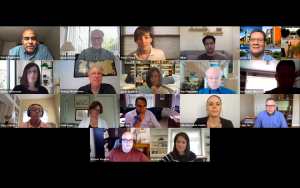It started as a casual discussion at a LearnLaunch holiday party late last year about the college to career skills gap. At Pragya, we had been working with universities and liberal arts colleges to help students track development of career relevant skills. In parallel, MIT J-WEL had been working with companies to map out the “human skills” that are valued most in employees. It seemed odd that these two groups weren’t really talking to each other.
Fast forward a few months, MIT J-WEL was organizing a human skills development workshop bringing together various stakeholders from the workforce. It seemed a good opportunity to follow through on our holiday conversation. We thought we’ll try to pull together a group of colleges to hear their perspective as well. I reached out to a few higher-ed leaders, not knowing who, if anyone, would be interested.

I was pleased and maybe a bit shocked at the phenomenal response. A dozen campus leaders from around the northeast, not just from liberal arts colleges, showed up for the discussion at MIT for an energetic and illuminating conversation. It sowed the seeds for something larger….
Stepping back...why do we care about human skills?
The U.S. government recently announced the intent to prioritize skil
ls over degrees in federal hiring. Governmental agencies are rarely trailblazers in initiatives like this. This topic has been at the forefront of employers across the world, with the concern of unfulfilled job openings and the growing skills gap. So, what are employers looking for? While digital skills are important, it turns out foundational human skills like critical thinking, problem solving and communication are regarded by employers as the best indicators of employee success. They are the most transferable across sectors, and the most sustainable even in the evolving AI-based economy. However, human skills are not yet treated as measurable competencies that can be taught and learned, and they are the hardest for students to connect to specific careers and jobs.
There are a few pockets of innovation, but by and large higher education institutions do not effectively articulate how liberal arts education maps to career relevant skills and competencies. As a result, employers often have to invest in “human skills” training programs to make fresh graduates career-ready. The questions students have started asking about ROI of liberal arts education have only increased with the financial uncertainties caused by the pandemic.
Is this only for liberal arts colleges?
Foundational human skill development applies to pathways across the higher education spectrum. Over half the jobs in the U.S require “middle skills” pathways. A 4-year degree is not essential for such jobs. A disproportionate number of students from disadvantaged backgrounds enroll in community colleges that prepare the workforce for these middle skill pathways. According to a research study by the World Economic Forum, the half-life of professional skills is only 5 years, and even shorter for technical skills. This means that the middle skilled workforce needs to continually be trained to be re-skilled. Human Skills like critical thinking, collaboration and initiative are the most portable and sustainable of all skills, as confirmed by various research studies. However, development of these Human Skills has heretofore been largely confined to the purview of liberal arts colleges or white collar employee training programs. Courses, experiential and co-curricular learning that emphasize and develop these crucial skills are rarely available in community colleges. As a result, a large section of the population are excluded from learning opportunities to develop these essential, enduring workforce skills. It is ironic that these skills are often referred to as “soft skills”, as opposed to the “hard skills” that go obsolete every few years!
This has brought to light some important challenges that higher education institutions must address, notably improving holistic advising of students, aligning learning experiences to employer needs and exploring new models that can address a broader segment of learners.
What can we do about it?
Pragya Systems and MIT J-WEL are collaborating to launch an initiative that brings together campus leaders and other key stakeholders in the learning ecosystem to address this problem. We are exploring successful strategies in both institutional practices and ecosystem partnerships that can move the ball forward. Beyond impacting the practices of higher education institutions via real case studies and outcomes from targeted experiments and pilots, we seek to generate outcomes that can serve as inputs to others in the learning ecosystem, such as pk-12 schools looking to improve the career readiness of their students and employers looking to source talent from non-traditional pipelines. Leaders from a dozen forward thinking institutions, including liberal arts and community colleges have joined this conversation.
If you are at an educational institution or a foundation that wants to be at the forefront of this change, please contact us:
Ramji Raghavan
Founder & CEO, Pragya Systems Corp.
ramji@pragyasystems.com